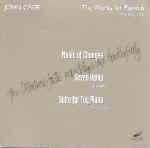In its size, scope, and difficulty, John Cage’s 1951 Music of Changes might be looked upon as a response to Pierre Boulez’s 1948 Second Piano Sonata. The results of Cage’s extraordinary pre-compositional rigor demand split-second changes in register, voicing, texture, varied pedalings, and too many dynamic levels for one player to absorb. Only the most dedicated and accomplished new-music pianists are able to realize Cage’s exacting notation with both accuracy and love. Martine Joste is such an artist. The mesmerizing control and authority she brings to each of the work’s four books is borne out of long familiarity and digestion, and it comes as no surprise that Cage himself praised her performances.
If you want to split hairs, the closer miking and deeper resonance of Joseph Kubera’s recording on Lovely Music yields clearer distinctions between Cage’s micromanaged pedal markings and crisper articulation of rapid arpeggiated gestures. However, Mode’s engineering bests MDG’s Cage Edition with Steffen Schleiermacher for presence and impact.
Joste brackets Music of Changes with two of Cage’s simplest keyboard works: the Webern-esque Seven Haiku (gorgeously nuanced and spaced) and the Suite for Toy Piano (too dryly recorded, and a bit sluggish and lacking in whimsy compared to Margaret Leng Tan’s lively interpretations for several labels). Daniel Charles’ booklet notes preach to the converted and hold more value for scholars, philosophers, musicologists, and serious Cage specialists than for general listeners.
































